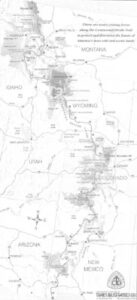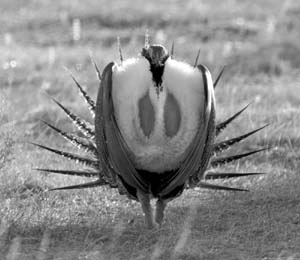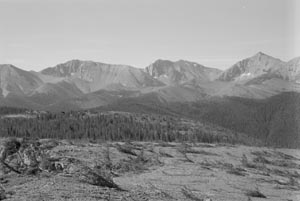YELLOWSTONE NATIONAL PARK–For 20 seasons, the simple life was its own reward for Bob Jackson, the only resident law enforcement officer in the most remote wilderness outpost of the lower 48 states–this park’s Thorofare district.
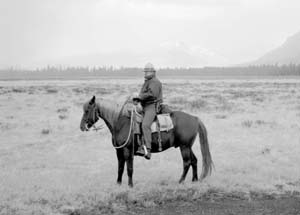
The woodwind echoes of shistling elk, the lacy imprint of grizzly bear tracks in autumn snow, the grandeur and solitude made up for the two-room cabin, the frigid outhouse, the $10,000 salary, the lack of pension and medical benefits, the wilderness scofflaws who poisoned his horses and periodically try to get him fired.
It is all part of a mystique he revels in as one of the last lawmen still chasing down outlaws on horseback. “Action Jackson” is perhaps Yellowstone’s most revered and reviled back country park ranger, poacher hunter and champion of the grizzly bear.
These days, new threats to the wilds he patrols every summer and fall along the southern boundary of the park have left Jackson with a sense of unaccustomed helplessness.
The Thorofare region is under siege, he warns, by unscrupulous hunters and commercial outfitters operating just outside the park’s sanctuary in the adjoining Teton Wilderness, where he has no authority.
Standing at the park boundary near his cabin, he points to dozens of illegal, artificial salt licks and to signs of reckless hunting practices. He says grizzly bears, which are on the endangered species list, and elk are being lured out of the park to their deaths, and the safety of backpackers and horseback riders is also in jeopardy from bullets flying into the park. Jackson has made his feelings known–and thus has found himself a lightning rod for controversy in one of the new West’s defining debates over wilderness and wildlife–in particular, the future of the grizzly, the park’s majestic icon.
The fate of the Yellowstone bears is again in question a quarter-century after they were nearly killed off. The federal government, contending that the bears are thriving, is moving toward taking grizzlies off the endangered list.
Many wildlife scientists object, however, and their skepticism has been reinforced by Jackson’s claims that the bears are vulnerable where they are supposed to be safest.
Jackson is no scientist. But mounted on his high-spirited sorrel, with the burnished stock of an old lever-action carbine poking out of its scabbard, the 52-year-old peace officer lends an air of authenticity to an environmental camp not usually known for its cowboy charisma.
And as a member of a vanishing breed, he said, he can identify with the grizzly bear. “Those bears are a unique living link with our untamed, pioneer heritage, and they deserve a place out here.”
Instead, a wilderness sanctuary has become “a killing zone,” he said, pointing to the litter of bone fragments scattered about one of the salt licks that dot the Thorofare country. The elk are attracted to the salt and the bear prey on the elk.
As fresh grizzly tracks and well-worn game trails make clear, the animals that congregate at these baiting stations are coming out of the safety of the park, where hunting is prohibited.
Four feet deep in places, the salt craters resemble misplaced sand traps strung across miles of mountain meadows.
Salt licks change the nature of big game hunting, eliminating what sportsmen refer to as “fair chase” and turning the experience into target practice.
Baiting wild animals with salt was first outlawed in East Africa in 1934 at the behest of big game hunters who said the practice corrupted their sport, like shooting fish in a barrel. The practice is illegal in many states and was banned in 1990 in federal wilderness areas in the United States.
Lack of Staff
Near Yellowstone, the high cost of eliminating salt-contaminated soil is one major obstacle to enforcing the law. The U.S. Forest Service, which has jurisdiction, says that it lacks the staff to patrol the 586,000-acre Teton Wilderness during hunting season and does not have the money to remove the salt from the ground.
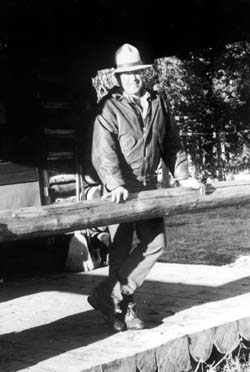
“I regret to say we haven’t had the presence we should have in the back country,” said Michael Schrotz, acting supervisor of the Bridger-Teton National Forest.
Also, in the Rocky Mountain West the law collides with a culture that is famously hostile to federal regulation, especially when business opportunities are at stake. And in glorious country like the Thorofare, teeming with cutthroat trout and trophy elk, business is thriving.
Jackson’s conception of the proper wilderness experience is a throwback, as he is, to the days when hunters in this region tended to be hearty souls willing to walk or ride for many miles just to get a shot at an elk. Hunting camps in those days did not offer hot baths and warm tents, let alone the prospect of bagging a set of antlers a stone’s throw from camp.
The landscape that Jackson patrols has changed along with the hunting ethic.
Today, the dim game trails once followed by explorers from Jim Bridger, the legendary 19th century scout and mountain man, to Teddy Roosevelt are broad, dusty corridors for daily caravans of hunters and fishermen who pay handsomely to be shepherded through the wilds. Along the way, meadows have been scoured by outfitter herds of 70 to 100 horses and vistas marred by semi-permanent hunting camps.
Visible for miles, the camps look like fortified compounds. Rows of big, bright-walled tents are fitted out with beds and stoves, and ringed by corrals and electrified fences to keep out bears and other hungry wildlife. All of this and the throbbing motors of portable generators have become fixtures in a federal wilderness area, despite a law that says the hand of man is to be almost invisible. In the Thorofare, outfitters pay a quarter of a million dollars or more for hunting camps along the border with Yellowstone Park, where the elk herds are big and the salt licks are most numerous. The hunters who come to these camps by the hundreds each fall pay $3,000 to $4,000 for the chance to shoot an elk, and the competitive pressure to give them their money’s worth is fierce.
Forest Service officials acknowledge that conditions in the Teton Wilderness have deteriorated.
“We certainly advocate the spirit of fair chase in hunting, and we have tried to promote a land ethic out there,” Schrotz said.
“Not enough monitoring has been done. We don’t have any grazing standards, and we know the ground has gotten pretty beaten up in places. We’re going to work with the outfitters to make changes,” Schrotz said.
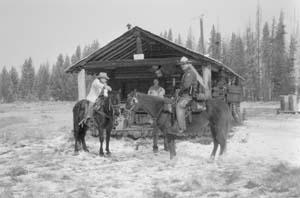
Wyoming Department of Game and Fish officials, meanwhile, are on record saying that salting the ground is a harmless vice–despite its being illegal under federal law–and not a bad way to cull the large Yellowstone elk herd. “After all, isn’t baiting kind of like putting a worm on a hook?” said state game warden John Hyde in response to Jackson’s criticism of the outlawed practice.
Jackson had just shown Hyde where hunters had been using an unmanned state Game and Fish cabin as a blind to shoot elk in a salt lick 25 yards away.
Others who have made the 30-mile horseback trip into the Thorofare Wilderness have been less sanguine about what they found.
“It is a disgrace,” said Tory Taylor in a letter to federal wildlife officials. Taylor is a hunting guide and secretary of the Wyoming Wildlife Federation who visited the Thorofare in late September.
“Purely for the sake of lazy hunters, these salt baiting stations have been set up, some less than 50 yards from Yellowstone Park,” Taylor said in an interview. “This is wild country. It doesn’t get any wilder, but it’s being operated as a game farm for rich ‘bubbas.’”
Richard Clark, an outfitter and director of the Professional Guide Institute at Western Montana College, decried the decline in back-country ethics but said that guides are merely reacting to the demands of hunters.
They’ll call up an outfitter, Clark said, and ask just two questions: “What is your kill ratio, and can I get a trophy elk (a buck with a large crown of antlers)?”
Jackson, who grew up on a farm in Iowa, was fresh out of college when he went to work as a seasonal ranger in Yellowstone in 1969. Nine years later, he was assigned to his present post.
He estimates he has spent 50,000 miles on horseback patrolling the park’s south boundary, following blood-flecked trails of animals that have been shot inside the park and then tracking down the hunters through thickets and streams.
“Where Bob is different,” said Clark, “he doesn’t give up just because he didn’t catch the guy in the act of shooting. He’ll take people to court on circumstantial evidence, footprints or spent cartridges, and get convictions. He’s cost outfitters a lot of money in penalties, $20,000 to $40,000, and some of them don’t forget.” Jackson’s horses were poisoned, his cabin was vandalized and his life was threatened during his first years in the Thorofare. And his campaign against salting has stirred old antagonisms.
“I think Bob Jackson is a loose cannon,” said outfitter Harold Turner. “I’ve questioned some of his actions in the past, and I think the information he has been putting out is self-serving and inaccurate.”
Turner was quoted by a Wyoming newspaper last year saying that his camps still use salt, although he recently denied having made the statement.
As for the grizzly bears, Turner said he thinks more of them are helped than hurt by the carcasses left behind by hunters.
“A bear can get the minimum amount of proteins he needs to get through the winter from one gut pile,” he said.
But Turner went on to say the loss of some bears would not be a bad thing.
“They’re eating themselves out of house and home. We’re going to have to eradicate some of the aggressive ones.”
Most Game Is Wasted
Undaunted, Jackson argues that the bears are becoming collateral casualties of wilderness salting. The grizzlies are drawn to the carcasses left in the salt pits by hunters interested primarily in taking home antlers. Leaving large portions of edible game to rot is also illegal under a Wyoming law banning wanton waste.
As the bears become habituated to a salt lick and its reliable cache of elk meat, the characteristically solitary grizzlies congregate, as if at a dump. As Jackson sees it, the chances of fatal encounters with heavily armed humans grow exponentially.
The majority of the 250 known grizzly bear deaths in the Yellowstone region over the last 20 years have occurred at the hands of hunters just outside the national park.
Typically, bears are killed during surprise encounters with hunters who are after elk, bighorn sheep or other legal prey. Although shooting a bear is illegal under the Endangered Species Act, exceptions are made in cases of self-defense. Hunters who claim self-defense are rarely charged with violating the act, even when they kill cubs.
Jackson lacks the authority to probe bear deaths outside the park. Federal agencies, authorized to protect bears and prosecute people who violate the law against salting, so far have not acted on Jackson’s allegations.
“Salting is clearly wrong. But tying it to bear mortalities, at least directly enough to make a case is not something anyone, including Bob, has been able to do,” said Dominic Domenici, a bear management expert with the U.S. Fish and Wildlife Service, the agency responsible for enforcing the Endangered Species Act and the leading federal advocate for removing Yellowstone grizzly bears from the endangered species list.
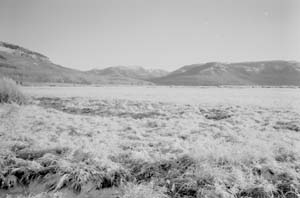
The pressure to “delist” is coming from the states bordering Yellowstone–Wyoming, Montana and Idaho. Officials there say that grizzly bears have become too numerous. They want a hunting season reestablished. They want broader latitude to kill bears any time that they are marauding livestock, even on public land, and they want restrictions relaxed on new development, roads and mechanized recreation in bear habitat. The current size of the Yellowstone grizzly population is estimated by experts at 400 and 600, three to four times the size it was when the bears were put on the endangered list.
The case for delisting presumes that the bears would be safe inside the heart of their current range–about 9,200 square miles of park land and wilderness–where the bears would be entitled to much of the same protection they receive under the act. But skeptics like Jackson say that the strategy effectively exiles the bears to an island of habitat too small to sustain a healthy population.
Food Sources Decline
Scientists including Mark Boyce, author of a congressional study on grizzly habitat, warn that the bears’ traditional food sources are declining all across the Yellowstone region. Bison herds are half the size they were during the 1980s. Cutthroat trout, on which bears in southern Yellowstone feed, are being devoured by illegally introduced lake trout, and a fungus is killing the white bark pine forests that supply nuts that many bears fatten up on in the fall.
Historically, bears have been in most peril when food shortages have caused them to stray from the safety of the park to places where conflicts with hunters and other people are more likely to occur. Jackson says that the salt pits, with their reliable cache of dead elk, are among the more likely places for such conflicts.
Last month, Utah State University ecologist Barrie Gilbert became the first bear scientist to second Jackson’s call for an investigation of illegal salting practices in the Teton Wilderness.
“We need to put pressure on the management agencies,” said Gilbert, who survived a near-fatal attack by a bear in 1978 to become one of the nation’s leading experts on grizzlies. His stature has bolstered Jackson’s contentions, at a time when the park ranger’s credibility is under attack by local outfitters.
“Action Jackson is the genuine article, a great back-country ranger with a deep love of the park,” said Bob Barbee, a former superintendent of Yellowstone Park who was Jackson’s boss for 12 years. Barbee is now the regional director of all national parks in Alaska.
Jackson closed the Thorofare cabin early this year, before the end of the hunting season. He said he needed to get back to his family’s bison farm in Iowa, but he said he was also glad to get away.
“I didn’t come to the most remote place in the 48 states to get into the middle of a controversy. I don’t like it when people don’t like me. But I don’t see how you can be out here in the middle of God’s country if you’re not going to defend it.”
Copyright 1999, Los Angeles Times. Reprinted with permission.
This article was originally written during Frank Clifford’s Alicia Patterson Foundation fellowship year. It was rewritten and published in the Los Angeles Times on November 5, 1999. Frank Clifford is now the editor for environmental news at the Los Angeles Times.
________________________________________
Postscript:
Famed Ranger Told to Not Discuss Park
By Deborah Schoch,
Times Environmental Writer
Los Angeles Times
Thursday October 11, 2001
After his 23 years in Yellow-stone, Bob Jackson’s future as a park ranger is no longer assured. Last summer, he was issued a gag order forbidding him to speak to the news media about any matters related to the park whether on or off duty. In addition, he was told to vacate his seasonal post in the Thorofare one month before the end of fall hunting season. The park’s public information officer said she was not authorized to discuss Jackson’s status, calling it a personnel matter. But others claim the National Park Service is caving in to political pressure from hunting outfitters who want Jackson ousted. “The bottom line is that Bob has walked between the outfitters and their loaf of bread, and they’re going to punish him through their connections with the Park Service,” said Dan Meyer, general counsel for Public Employees for Environmental Responsibility, a whistle blower group that is representing Jackson.
Copyright 2001, Los Angeles Times.
Reprinted by permission.
This article was summarized by Frank Clifford, Los Angeles Times, for this publication.

